Drafting with AI
Stable diffusion
Stable Diffusion is a deep learning, text-to-image model released in 2022. It is primarily used to generate detailed images conditioned on text descriptions, though it can also be applied to other tasks such as inpainting, outpainting, and generating image-to-image translations guided by a text prompt.
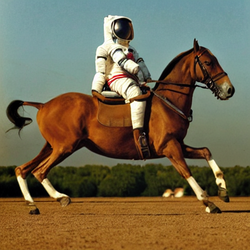
An image generated by Stable Diffusion based on the text prompt:
"a photograph of an astronaut riding a horse"
If you use this AI to create images, you can get plausible rendered images easily and shortly with a few lines of text. Let's think about how this can be utilized in the field of architecture.

"a photograph of an astronaut riding a horse"
If you use this AI to create images, you can get plausible rendered images easily and shortly with a few lines of text. Let's think about how this can be utilized in the field of architecture.
Application in the field of architecture
There are several rendering engines that are frequently used in the field of architectural design, but they require precise modeling for good rendering. At the start of a design project, we can throw a very rough model or sketch to the AI, and type in the prompts to get a rough idea of what we're envisioning.
First, let's see the simple example. The example below is an example of capturing the rhino viewport in Rhino's
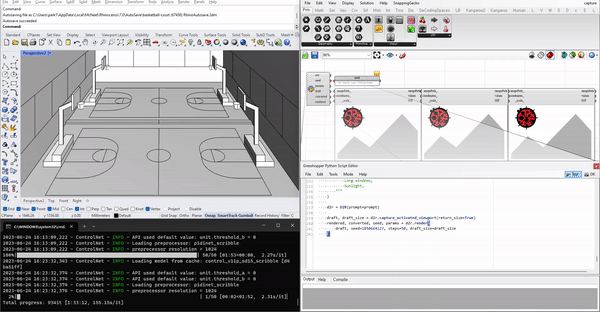
Demo for using stable diffusion in Rhino environment
Prompt: Colorful basketball court, Long windows, Sunlight
First, We need to write code for capturing the rhino viewport. I made it to be saved in the path where the current *.gh file is located.
Next, we should to run our local API server after cloning
First, let's see the simple example. The example below is an example of capturing the rhino viewport in Rhino's
GhPython environment and then rendering the image in the desired direction using ControlNet of the stable diffusion API. 
Prompt: Colorful basketball court, Long windows, Sunlight
First, We need to write code for capturing the rhino viewport. I made it to be saved in the path where the current *.gh file is located.
def capture_activated_viewport(
self, save_name="draft.png", return_size=False
):
"""
Capture and save the currently activated viewport
to the location of the current *.gh file path
"""
save_path = os.path.join(CURRENT_DIR, save_name)
viewport = Rhino.RhinoDoc.ActiveDoc.Views.ActiveView.CaptureToBitmap()
viewport.Save(save_path, Imaging.ImageFormat.Png)
if return_size:
return save_path, viewport.Size
return save_path
Next, we should to run our local API server after cloning
stable-diffusion-webui repository. Please refer this AUTOMATIC1111/stable-diffusion-webui repository for settings required for running local API server. When all settings are done, now you can request the methods you want through API calls. I referred API guide at AUTOMATIC1111/stable-diffusion-webui/wiki/API Drafting
Python serves a built-in module called
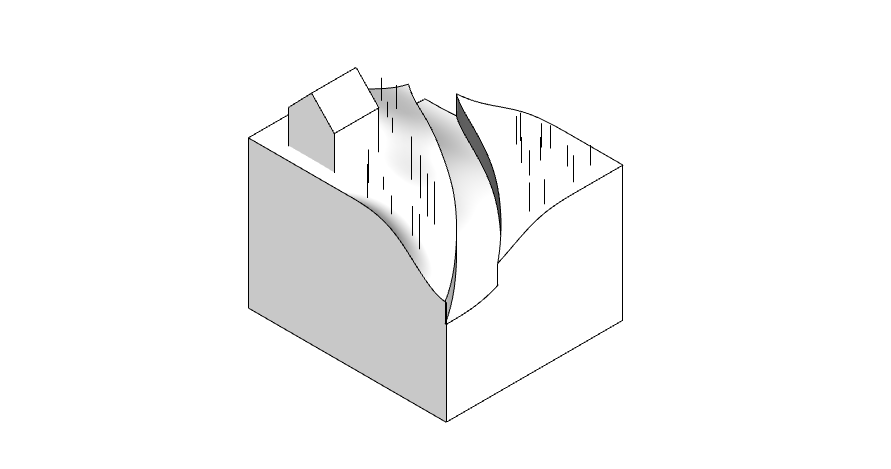
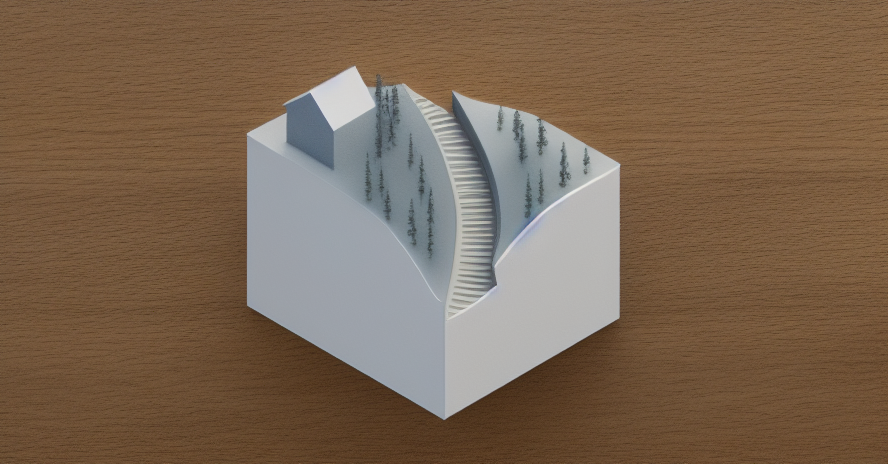
Physical model
From the left, Drfat view · Rendered view
Prompt: Isometric view, River, Trees, 3D printed white model with illumination
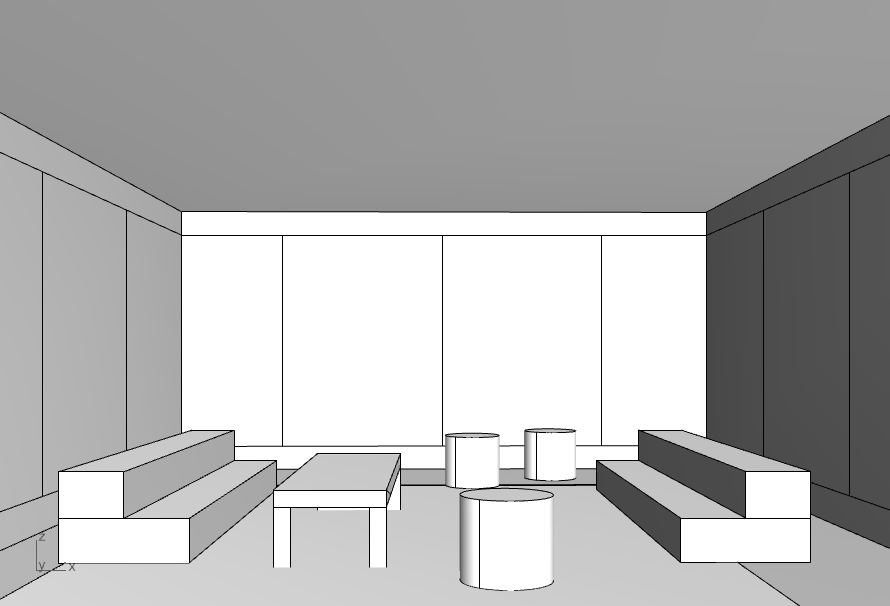
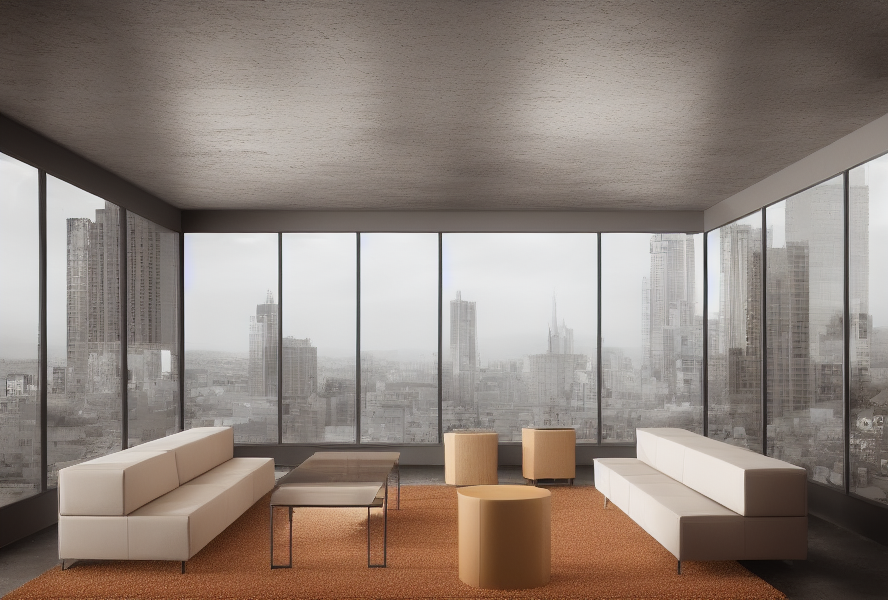
Interior view
From the left, Drfat view · Rendered view
Prompt: Interior view with sunlight, Curtain wall with city view, Colorful sofas, Cushions on the sofas, Transparent glass table, Fabric stools, Some flower pots
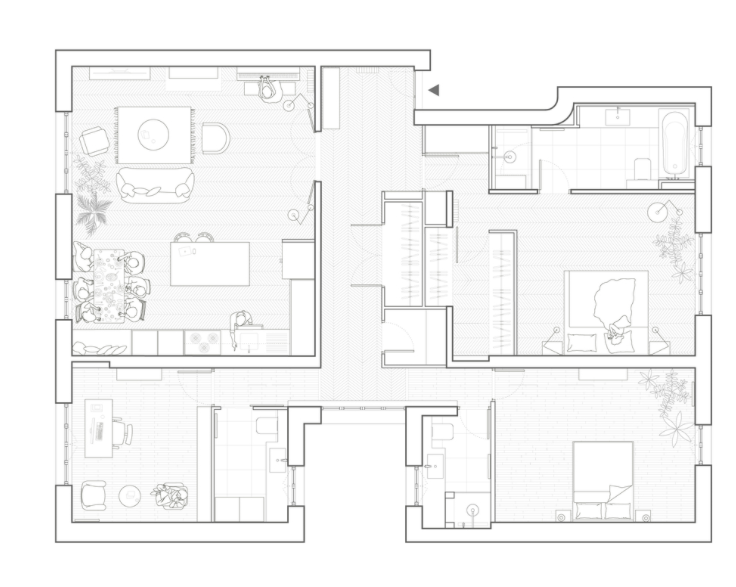
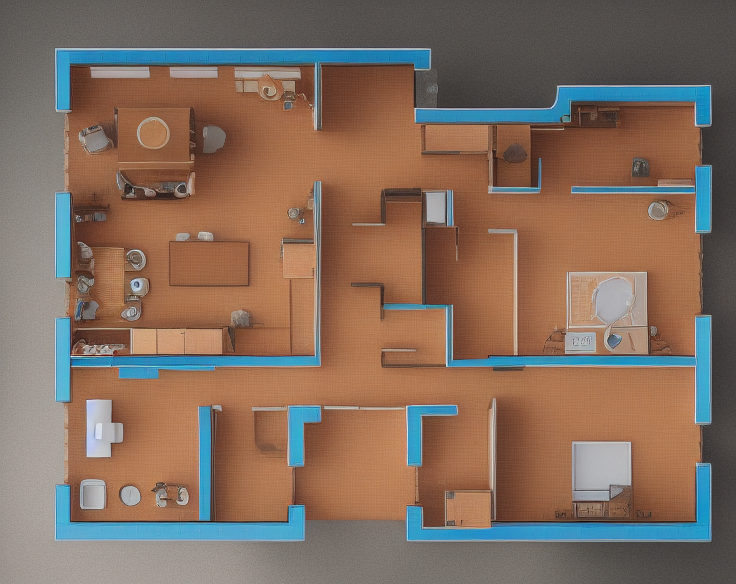
Floor plan
From the left, Drfat view · Rendered view
Prompt: Top view, With sunlight and shadows, Some flower pots, Colorful furnitures, Conceptual image
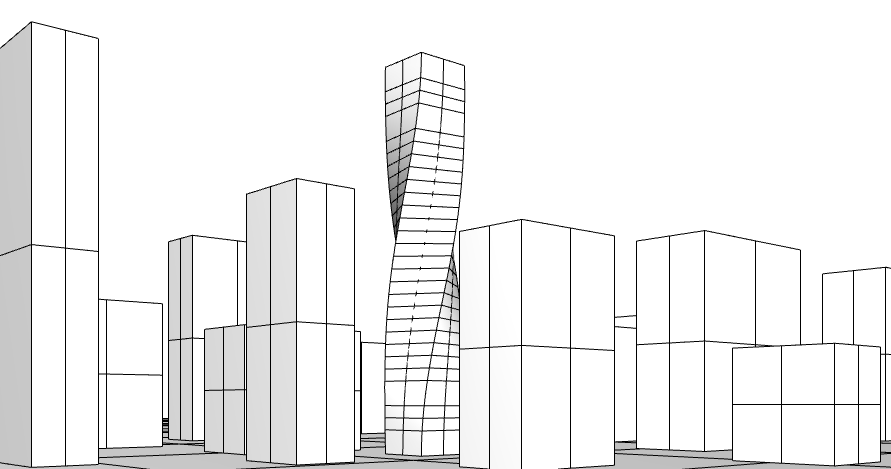
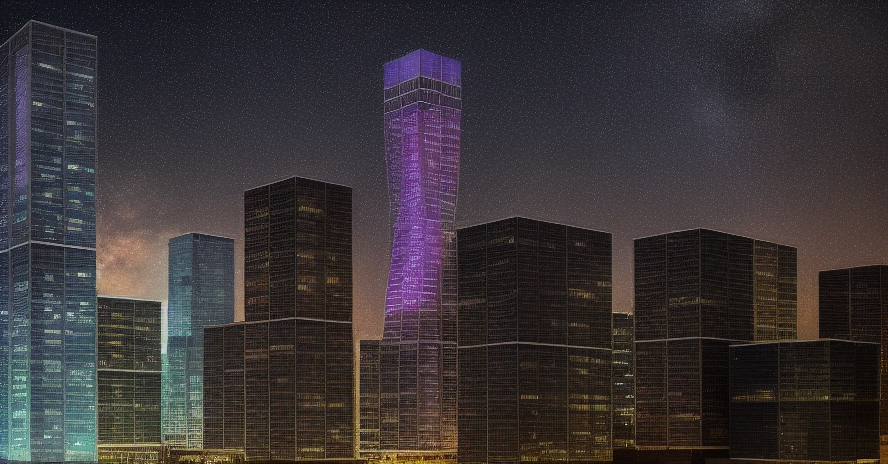
Skyscrappers in the city
From the left, Drfat view · Rendered view
Prompt: Skyscrapers in the city, Night scene with many stars in the sky, Neon sign has shine brightly, Milky way in the sky
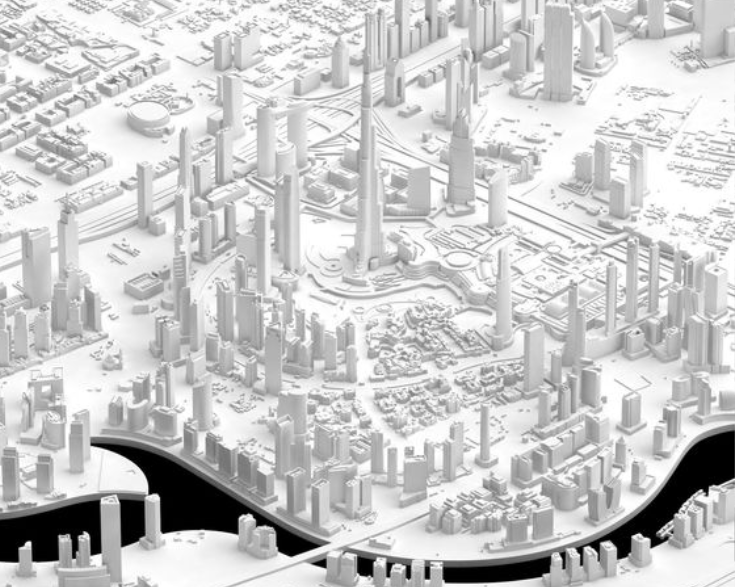
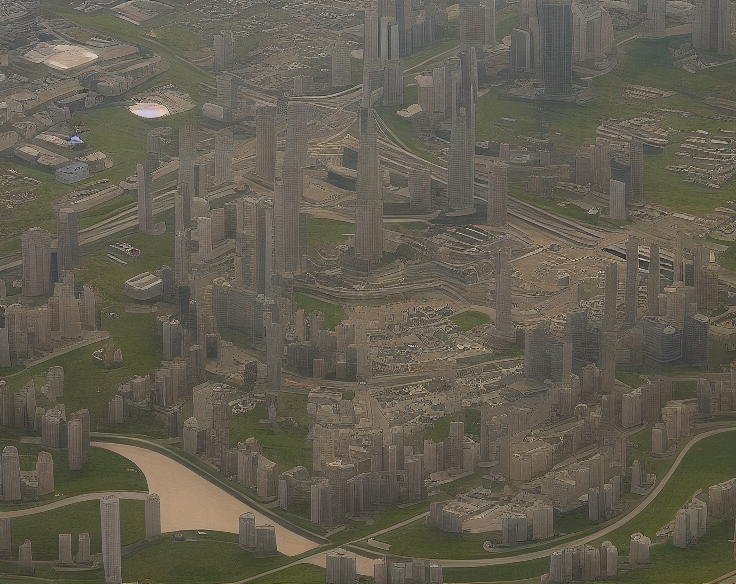
Contour
From the left, Drfat view · Rendered view
Prompt: Bird's eye view, Colorful master plan, Bright photograph, River
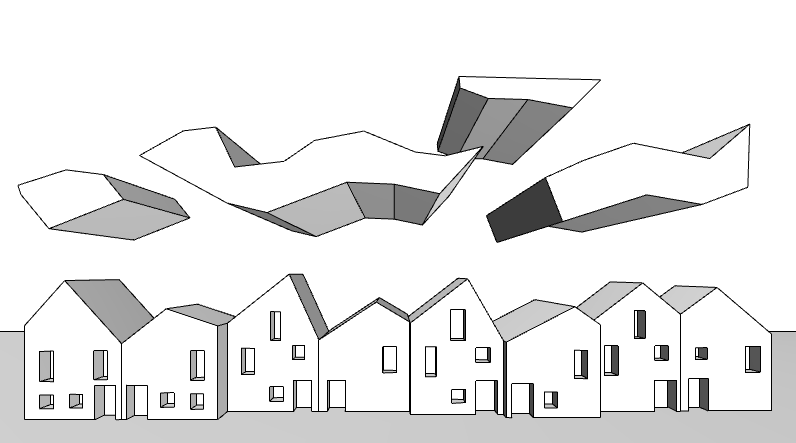
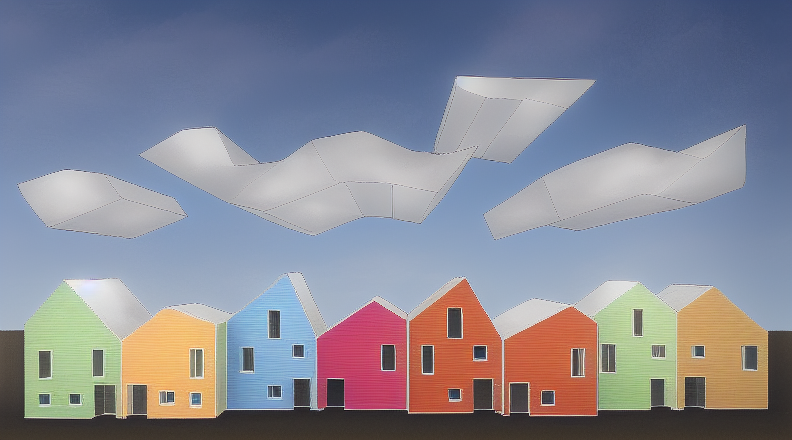
Gabled houses
From the left, Drfat view · Rendered view
Prompt: Two points perspective, White clouds, Colorful houses, Sunlight
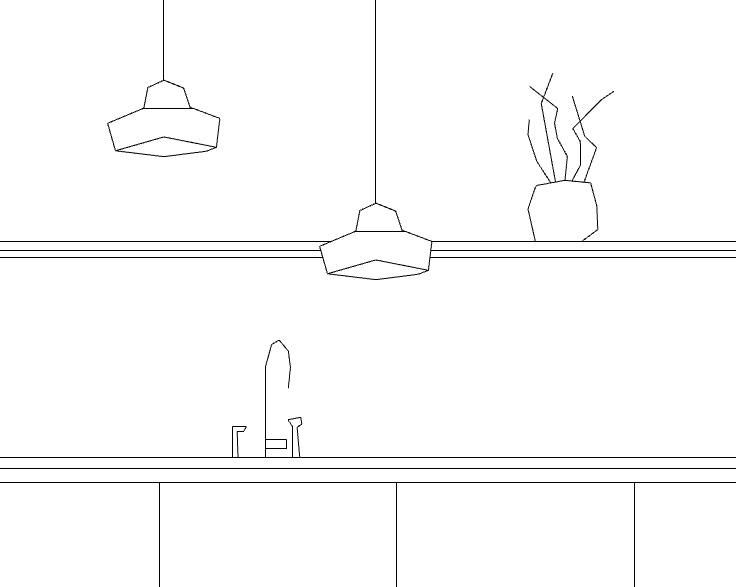
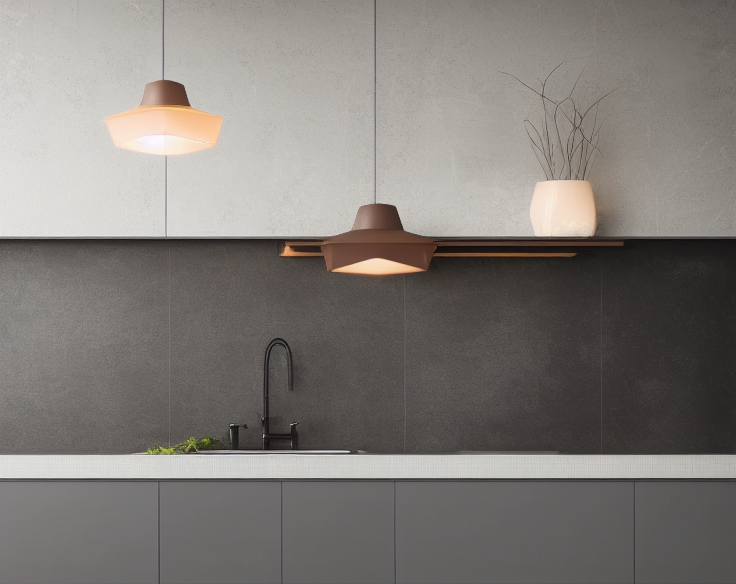
Kitchen
From the left, Drfat view · Rendered view
Prompt: Front view, Kitchen with black color interior, Illuminations
urllib to use HTTP. You can check the code to the API request used in the GhPython at this link.
import os
import json
import Rhino
import base64
import urllib2
import scriptcontext as sc
import System.Drawing.Imaging as Imaging
class D2R:
"""Convert Draft to Rendered using `stable diffusion webui` API"""
def __init__(
self, prompt, width=512, height=512, local_url="http://127.0.0.1:7860"
):
self.prompt = prompt
self.width = width
self.height = height
self.local_url = local_url
(...)
def render(self, image_path, seed=-1, steps=20, draft_size=None):
payload = {
"prompt": self.prompt,
"negative_prompt": "",
"resize_mode": 0,
"denoising_strength": 0.75,
"mask_blur": 36,
"inpainting_fill": 0,
"inpaint_full_res": "true",
"inpaint_full_res_padding": 72,
"inpainting_mask_invert": 0,
"initial_noise_multiplier": 1,
"seed": seed,
"sampler_name": "Euler a",
"batch_size": 1,
"steps": steps,
"cfg_scale": 4,
"width": self.width if draft_size is None else draft_size.Width,
"height": self.height if draft_size is None else draft_size.Height,
"restore_faces": "false",
"tiling": "false",
"alwayson_scripts": {
"ControlNet": {
"args": [
{
"enabled": "true",
"input_image": self._get_decoded_image_to_base64(image_path),
"module": self.module_pidinet_scribble,
"model": self.model_scribble,
"processor_res": 1024,
},
]
}
}
}
request = urllib2.Request(
url=self.local_url + "/sdapi/v1/txt2img",
data=json.dumps(payload),
headers={'Content-Type': 'application/json'}
)
try:
response = urllib2.urlopen(request)
response_data = response.read()
rendered_save_path = os.path.join(CURRENT_DIR, "rendered.png")
converted_save_path = os.path.join(CURRENT_DIR, "converted.png")
response_data_jsonify = json.loads(response_data)
used_seed = json.loads(response_data_jsonify["info"])["seed"]
used_params = response_data_jsonify["parameters"]
for ii, image in enumerate(response_data_jsonify["images"]):
if ii == len(response_data_jsonify["images"]) - 1:
self._save_base64_to_png(image, converted_save_path)
else:
self._save_base64_to_png(image, rendered_save_path)
return (
rendered_save_path,
converted_save_path,
used_seed,
used_params
)
except urllib2.HTTPError as e:
print("HTTP Error:", e.code, e.reason)
response_data = e.read()
print(response_data)
return None
if __name__ == "__main__":
CURRENT_FILE = sc.doc.Path
CURRENT_DIR = "\\".join(CURRENT_FILE.split("\\")[:-1])
prompt = (
"""
Interior view with sunlight,
Curtain wall with city view
Colorful Sofas,
Cushions on the sofas
Transparent glass Table,
Fabric stools,
Some flower pots
"""
)
d2r = D2R(prompt=prompt)
draft, draft_size = d2r.capture_activated_viewport(return_size=True)
rendered, converted, seed, params = d2r.render(
draft, seed=-1, steps=50, draft_size=draft_size
)


From the left, Drfat view · Rendered view
Prompt: Isometric view, River, Trees, 3D printed white model with illumination


From the left, Drfat view · Rendered view
Prompt: Interior view with sunlight, Curtain wall with city view, Colorful sofas, Cushions on the sofas, Transparent glass table, Fabric stools, Some flower pots


From the left, Drfat view · Rendered view
Prompt: Top view, With sunlight and shadows, Some flower pots, Colorful furnitures, Conceptual image


From the left, Drfat view · Rendered view
Prompt: Skyscrapers in the city, Night scene with many stars in the sky, Neon sign has shine brightly, Milky way in the sky


From the left, Drfat view · Rendered view
Prompt: Bird's eye view, Colorful master plan, Bright photograph, River


From the left, Drfat view · Rendered view
Prompt: Two points perspective, White clouds, Colorful houses, Sunlight


From the left, Drfat view · Rendered view
Prompt: Front view, Kitchen with black color interior, Illuminations